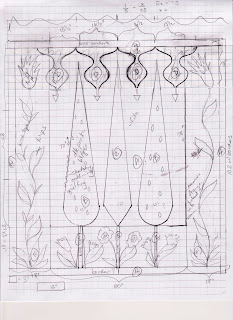Readers of this blog may recall how bowled over I was by the gorgeous Iznik tiles covering the walls of Topkapi Palace in Istanbul. Since then I have been reading up on them (check out Iznik: The Artistry of Ottoman Ceramics by Walter Denny if you want to see mouth-watering pictures and an exhaustive history of the art form). We also purchased a small but gorgeous Turkish rug, which we keep on our bedroom floor, where it is off-limits to the dog, who has a habit of chewing rug fringe.
Alas, the quilt currently on the bed clashes horribly with the rug, so a new quilt is in order, obviously. Every time I swear I'm done making quilts, I find an
Here is the sketch:
and here is a cleaned up version that I colored in.
I am just starting to scale up the elements in the sketch to full size and make paper templates to use as patterns for the motifs. Here's a photo of the templates for tree shapes and the top border, cut out full size from newsprint:
No doubt the design will continue to evolve as I work. This will be an applique quilt, in which all the trees, flowers, stems and leaves will be cut-out shapes of fabric whose edges are turned under and sewn with tiny hemstitches--appliqued--to the white background. I've also been researching ways of doing applique since my last applique quilt was made 20 years ago. It's another excuse to buy books and troll the World Wide Web! I've discovered that everyone has a different idea of the "best" way to turn under those edges smoothly and neatly and keep them turned under while you stitch them in place. I've already tried fusing the shapes to the background and machine stitching the raw edges and found that more frustrating than fun. See below the pillow project I have abandoned. Machine stitching those tiny pieces and sharp corners requires way more patience and dexterity at the sewing machine than I have. And hand-stitching through fused fabric is not my idea of fun either. (This pattern is from Constantinople Quilts, by Tamsin Harvey.)
I haven't yet designed all the templates for the flowers and leaves in the quilt, but I need to take a quick detour from the drawing board first. I need to find out how small and fiddly I can make my shapes and still manage to stitch them together without losing my mind. Time to make some samples. Then back to the drawing board. . . .As I remind my students, the design process is more of a spiral than a straight line.
My fantasy is to have handwork I can curl up on the couch with, a project whose pieces I can pin (or glue-stick??) together in advance and mindlessly stitch up in the evening. Stay tuned for whether this "affair" lives up to the fantasy!







No comments:
Post a Comment